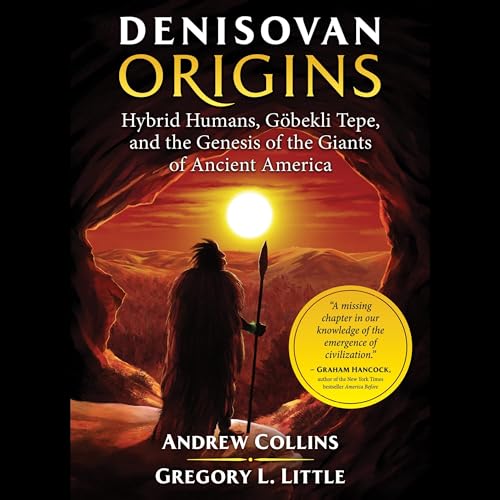
Denisovan Origins
Hybrid Humans, Göbekli Tepe, and the Genesis of the Giants of Ancient America
Échec de l'ajout au panier.
Échec de l'ajout à la liste d'envies.
Échec de la suppression de la liste d’envies.
Échec du suivi du balado
Ne plus suivre le balado a échoué
0,99 $/mois pendant vos 3 premiers mois
 Exclusivité Prime: 2 titres
gratuits à choisir pendant l'essa. Des conditions s’appliquent.
Exclusivité Prime: 2 titres
gratuits à choisir pendant l'essa. Des conditions s’appliquent.
Acheter pour 22,53 $
Aucun mode de paiement valide enregistré.
Nous sommes désolés. Nous ne pouvons vendre ce titre avec ce mode de paiement
-
Narrateur(s):
-
Micah Hanks
-
Auteur(s):
-
Andrew Collins
-
Gregory L. Little
À propos de cet audio
Reveals the profound influence of the Denisovans and their hybrid descendants upon the flowering of human civilization around the world
- Traces the migrations of the sophisticated Denisovans and their interbreeding with Neanderthals and early human populations more than 40,000 years ago
- Shows how Denisovan hybrids became the elite of ancient societies, including the Adena mound-building culture
- Explores the Denisovans’ extraordinary advances, including precision-machined stone tools and jewelry, tailored clothing, and celestially-aligned architecture
Ice-age cave artists, the builders at Göbekli Tepe, and the mound-builders of North America all share a common ancestry in the Solutreans, Neanderthal-human hybrids of immense sophistication, who dominated southwest Europe before reaching North America 20,000 years ago. Yet, even before the Solutreans, the American continent was home to a powerful population of enormous stature, giants remembered in Native American legend as the Thunder People. New research shows they were hybrid descendants of an extinct human group known as the Denisovans, whose existence has now been confirmed from fossil remains found in a cave in the Altai region of Siberia.
Tracing the migrations of the Denisovans and their interbreeding with Neanderthals and early human populations in Asia, Europe, Australia, and the Americas, Andrew Collins and Greg Little explore how the new mental capabilities of the Denisovan-Neanderthal and Denisovan-human hybrids greatly accelerated the flowering of human civilization over 40,000 years ago. They show how the Denisovans displayed sophisticated advances, including precision-machined stone tools and jewelry, tailored clothing, celestially-aligned architecture, and horse domestication. Examining evidence from ancient America, the authors reveal how Denisovan hybrids became the elite of the Adena mound-building culture, explaining the giant skeletons found in Native American burial mounds. The authors also explore how the Denisovans’ descendants were the creators of a cosmological death journey and viewed the Milky Way as the Path of Souls.
Revealing the impact of the Denisovans upon every part of the world, the authors show that, without early man’s hybridization with Denisovans, Neanderthals, and other yet-to-be-discovered hominid populations, the modern world as we know it would not exist.
©2019 Andrew Collins and Gregory L. Little (P)2019 Inner Traditions AudioCe que les critiques en disent
"Collins and Little are the perfect team to address one of humanity’s greatest enigmas.... From giant skeletons to the mysterious mound builders of ancient America, this team assembles the lost pieces of the human time line." (Sidney D. Kirkpatrick, award-winning New York Times best-selling author and documentary film director)
"Andrew Collins and Greg Little are two of the most respected writers in the ancient mysteries subject. They team up to provide a comprehensive account of the enigmatic Denisovans and their impact on the emergence of modern human society. If they are correct in their findings, as I very much suspect they are, then they have discovered a missing chapter in our knowledge of the emergence of civilization, both in the ancient world and - as I put forward in my own book America Before - in the Americas." (Graham Hancock, author of the New York Times best seller America Before)
Ce que les auditeurs disent de Denisovan Origins
Moyenne des évaluations de clientsÉvaluations – Cliquez sur les onglets pour changer la source des évaluations.
-
Au global2 out of 5 stars
-
Performance1 out of 5 stars
-
Histoire3 out of 5 stars
- Me
- 2020-06-27
terrible narration
the narration is so bad it ruins everything. Quit listening it was so bad. like someone reading aloud in a class
Un problème est survenu. Veuillez réessayer dans quelques minutes.
Vous avez donné votre avis sur cette évaluation.
Vous avez donné votre avis sur cette évaluation.
2 les gens ont trouvé cela utile




